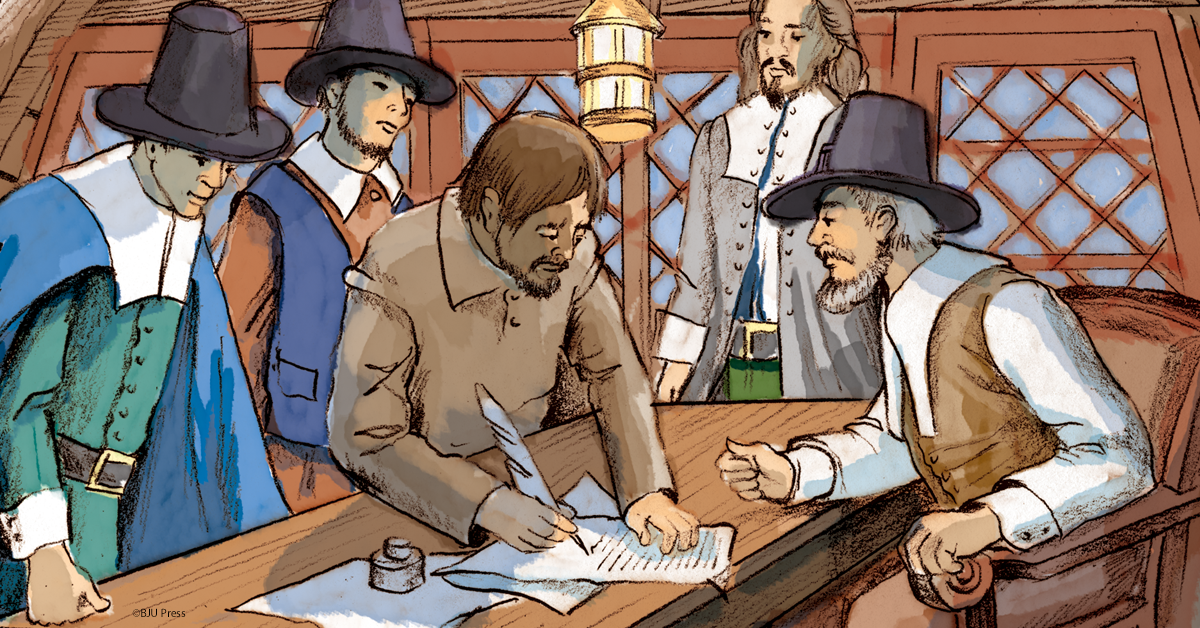The following account of the Pilgrims first Thanksgiving demonstrates how much they had to thank God for. It’s a celebration of God’s preserving grace.
A small group of English Separatist Christians waited to board their ship, the Speedwell. They had lived in Holland for twelve years and were longing to taste freedom. They set out for the New World to spread the gospel, preserve their own language and culture, and bring up their children according to the dictates of their own consciences.
The voyagers loaded food and cargo onto the Speedwell. William Brewster brought along his printing press and almost two hundred books. On July 22, 1620, with a fair wind, the Pilgrims knelt and prayed for God’s blessing. They set sail for England, where they would join the Mayflower.
Both ships sailed for the New World on August 5, 1620. Within three days the Speedwell began taking on water and twice had to turn back. All the Pilgrims had to board the Mayflower.
Finally, the Mayflower set sail a month behind schedule with 102 passengers. With travel provisions already consumed, supplies would last only two months more. But they had sold their houses and could not turn back.
They faced not only shortages but also harassment from some of the sailors. One self-appointed leader jeered at the Christians’ seasickness and boasted that he would soon sew them all into shrouds. Ironically, within hours, he himself died of a strange fever. His was the first shrouded body to go overboard. The mocking ceased.
Halfway across the Atlantic the Mayflower encountered a violent storm that snapped the crossbeam supporting the mainmast. The situation was desperate until someone remembered the great iron screw of Elder Brewster’s printing press. Placing the press beneath the beam, they raised it back to its proper position. It held for the rest of the voyage.
By now their food was almost inedible. The bread was rock hard, the grain bug-infested, and there was no fresh water. But on November 9, the Pilgrims heard the cry, “Land-ho!” Tears of relief mingled with shouts of joy and prayers of thanks.

Captain Christopher Jones informed them that they had reached Cape Cod—far north of where their patent entitled them to settle. But winter was too close to permit any more searching. As they had begun their long voyage by kneeling on the dock at Delftshaven to ask God’s guidance, so they ended it kneeling in gratitude on the sands of Cape Cod.
Providentially, they found land already cleared at Plymouth. It seemed as if unseen friends had prepared this very spot. But the summer growing season was over, and a bitter winter would follow.
By April 1621 the Pilgrims had lost twenty-eight of their original forty-eight male adults and forty-seven people in all. But in God’s mercy, an Indian named Samoset, who had learned to speak English from fishing captains, walked into their camp! He had a remarkable story to tell the Pilgrims.
According to Samoset, that area used to belong to a large hostile tribe that killed every white man who had landed there. But four years before, a mysterious plague had devastated the entire tribe. Convinced that some great spirit was responsible, neighboring tribes had shunned the entire area.
In October of 1621 Governor William Bradford declared a day of public thanksgiving. The Pilgrims furnished turnips, cabbages, carrots, onions, parsnips, cucumbers, radishes, and beets from their gardens for the feast. Ninety Indians joined them with venison and wild turkeys.
Elder Brewster led in prayer to God, whose providence had guided and protected them. “We have noted these things,” said Bradford, “so that you might see their worth and not negligently lose what your fathers have obtained with so much hardship.”
[Adapted from “The Pilgrims and God’s Providence” by David O. Beale, Faith of Our Fathers: Scenes from American Church History, edited by Mark Sidwell, pages 8–12.]
What are you praising our gracious God for during this season of thanks?